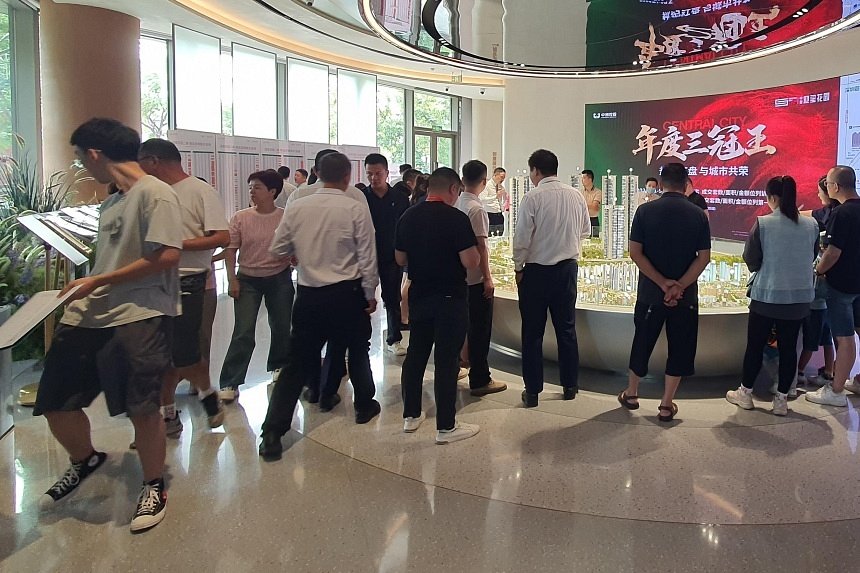BEIJING/SHENZHEN – Shenzhen real estate agent Feng Kunzhu, 34, barely had time to eat at the start of China’s Golden Week holidays from Oct 1, a day after the Chinese government eased home-buying curbs in its latest bid to rescue the country’s ailing property market.
Potential home buyers, including those from out of town who are now free to purchase a wider range of properties in parts of Shenzhen, have thronged show-flats across the southern Chinese city.
Mr Feng, who works with real estate agency Beike, called this surge in business “rain after a long drought”. He had one client who put in an offer after just half an hour of viewing a property, he said.
“There were more clients than I could bring around,” he told The Straits Times on Oct 5, near a cluster of new property developments by the Shenzhen North railway station. “It’s been tiring, but I am happy to be tired.”
In at least 25 Chinese cities, homes are being sold in numbers not seen since the housing market came crashing down in 2021, after a regulatory crackdown on high leverage among property developers triggered a liquidity crisis, leaving a trail of uncompleted homes after some developers defaulted on their debts.
Based on data from the Beijing-based real estate research institute China Index Academy, released on Oct 8, the number of new homes sold in the first seven days of October jumped 27 per cent over the same period in 2023.
New home sales in the first week of October in Beijing and Shanghai exceeded that for the whole of September, while Guangzhou and Shenzhen’s sales doubled the previous month’s, the institute’s data showed.
While some developers are signalling their optimism by cancelling discounts or raising prices after the Golden Week surge of interest, analysts doubt this buzz can be sustained past the holidays, which ended on Oct 7.
Mr Gary Ng, a Hong Kong-based senior economist at investment bank Natixis, said such episodes of increased home sales after policy relaxations have occurred in the past, so it is unclear how long the surge may last.
“At this stage, households will feel more changes in sentiment, but it depends on implementation in the next few months, such as whether interest rates will fall further and quickly,” he said.
Mr Yan Yuejin, vice-president of the E-house China R&D Institute in Shanghai, said price increases while the market is hot can be viewed as a strategy to draw buyers who are sitting on the fence.
“The percentage of price increase is kept within a controlled range of 2 per cent because developers know they can’t increase the prices too much, as there is still an oversupply of unsold homes now,” he said.
On the evening of Sept 30, the four tier-1 cities – Beijing, Shanghai, Guangzhou and Shenzhen – announced home easing measures and lower down payment requirements before the Golden Week holiday. Other cities followed suit.
Over the Oct 5 and 6 weekend during the holiday, some show-flats in Beijing and Shenzhen received a stream of prospective buyers when The Straits Times visited.
At the crowded showroom of Central City in north Shenzhen, Madam Zhang Jie, a Zhuhai resident in her 50s who had been thinking about buying a flat for her son, decided to take the plunge.

